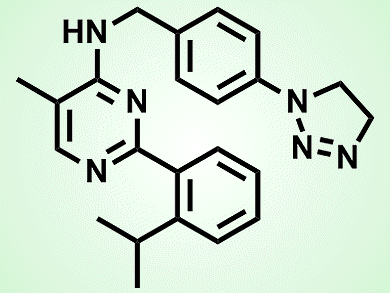Cisplatin, the first-line drug for the treatment of ovarian, lung, and bladder cancers, kills tumor cells by damaging their DNA. Malignant cells, however, develop mechanisms to repair the damaged DNA and, therefore, they survive cisplatin treatment.
Zhihao Zhuang, University of Delaware, Newark, DE, USA, and co-workers identified a chemical that sensitizes tumor cells to cisplatin’s action. The new molecule, ML323 (pictured), potently and selectively inhibits an enzymatic complex formed by USP1 (ubiquitin carboxyl-terminal hydrolase 1) and its activator UAF1 (USP1 associated factor 1). This complex promotes DNA repair by removing ubiquitin chains from proteins involved in this process. As a consequence, by inhibiting USP1/UAF1, ML323 blocks cancer cells from repairing cisplatin-induced DNA damage, ultimately killing cisplatin-resistant tumor cells.
ML323 may, thus, be a promising tool to fight cancer cells resistance to platinum-based chemotherapeutic drugs.
- A selective USP1–UAF1 inhibitor links deubiquitination to DNA damage responses,
Qin Liang, Thomas S Dexheimer, Ping Zhang, Andrew S Rosenthal, Mark A Villamil, Changjun You, Qiuting Zhang, Junjun Chen, Christine A Ott, Hongmao Sun, Diane K Luci, Bifeng Yuan, Anton Simeonov, Ajit Jadhav, Hui Xiao, Yinsheng Wang, David J Maloney, Zhihao Zhuang,
Nat. Chem. Biol. 2014.
DOI: 10.1038/nchembio.1455




